It would be deeply unfair to offer only a list of dreadful books about the Balkans Wars and not mention the other kind – the books that help the overall understanding of the region and the turmoil it has been undergoing for the past decade or so. Unfortunately, but not surprisingly, the number of good books about the region is fairly low. Even so, it is entirely likely that some good works out there might be overlooked by the list below.
One must keep in mind another fact. None of these books gives the full picture of the crisis. Some try, some succeed better than others, but the story of Yugoslavia in the 1990s is so complex, it is nearly impossible to tell in one volume. There is no "Yugoslav Crisis for Dummies" or "Idiot’s Guide to Balkans Wars" on this list. To find them, you will have to go elsewhere.
So without further ado, the books.
Testimonies
In producing their works, historians often rely on "primary sources"– accounts of people who have actually witnessed, or participated in the event in question. As a side note, despite being treated as such, journalists often should not be considered primary sources. Too many have deliberately misinterpreted the facts that their lies reverberate through media coverage even today.
On the other hand, though in some part necessarily self-serving, memoirs of officials and dignitaries who were actually on the ground making the news – as opposed to inventing it – are the real primary sources of intrinsic value.
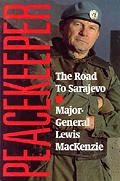 Take for example, Peacekeeper: The Road to Sarajevo, by the man fully deserving of the title. Canadian Major-General Lewis McKenzie was not only the first UN commander in Sarajevo, but a veteran of almost all UN peacekeeping missions. Half the book is the account of those missions, and is interesting in its own right. However, the part that focuses on Bosnia in 1992 is truly captivating.
Take for example, Peacekeeper: The Road to Sarajevo, by the man fully deserving of the title. Canadian Major-General Lewis McKenzie was not only the first UN commander in Sarajevo, but a veteran of almost all UN peacekeeping missions. Half the book is the account of those missions, and is interesting in its own right. However, the part that focuses on Bosnia in 1992 is truly captivating.
In Peacekeeper, McKenzie described what would later become a pattern for every UN commander in Bosnia. Though both Serbs and Muslims greeted him cordially at first, the latter quickly turned on him when he refused to take their side. McKenzie even pointed out some Muslim abuses, earning the undying hatred of the Sarajevo regime. They’ve pilloried him as "pro-Serb" and even concocted a vicious rumor about his involvement with "Serb rape camps."
Peacekeeper is a poignant chronicle of events in Sarajevo during the fateful summer of 1992, a must-read.
 Balkan Odyssey, by Lord David Owen, is an important bit of diplomatic history. The frustrated British negotiator recounts in this memoir how he vainly tried to mediate between the warring factions in Bosnia while both the western media and the American government did their best to make him fail.
Balkan Odyssey, by Lord David Owen, is an important bit of diplomatic history. The frustrated British negotiator recounts in this memoir how he vainly tried to mediate between the warring factions in Bosnia while both the western media and the American government did their best to make him fail.
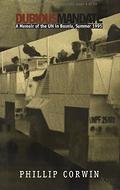 A little-known but brilliant book is Philip Corwin’s Dubious Mandate, a superb, first-hand account of how the Empire subverted and abused the UN force in Bosnia, using the peacekeeping mission as subterfuge for intervention. However, it is best to be somewhat familiar with the situation in the 1995 Bosnia before reading this book.
A little-known but brilliant book is Philip Corwin’s Dubious Mandate, a superb, first-hand account of how the Empire subverted and abused the UN force in Bosnia, using the peacekeeping mission as subterfuge for intervention. However, it is best to be somewhat familiar with the situation in the 1995 Bosnia before reading this book.
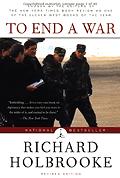 Perhaps the most important testimony, though, is Richard Holbrooke’s To End A War. Surprised? Don’t be. While Holbrooke’s memoir should definitely not be taken at face value – especially when it comes to his misconceptions about the Balkans peoples – his arrogant honesty paints a forthright picture of Imperial intervention, its motives and methods. Many of the things Holbrooke says without thinking his colleagues would fear to even contemplate, let alone speak out loud. If for that alone, this book is a treasure – though at times it may induce vomiting. (see review)
Perhaps the most important testimony, though, is Richard Holbrooke’s To End A War. Surprised? Don’t be. While Holbrooke’s memoir should definitely not be taken at face value – especially when it comes to his misconceptions about the Balkans peoples – his arrogant honesty paints a forthright picture of Imperial intervention, its motives and methods. Many of the things Holbrooke says without thinking his colleagues would fear to even contemplate, let alone speak out loud. If for that alone, this book is a treasure – though at times it may induce vomiting. (see review)
Histories
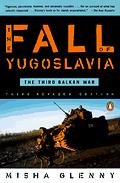 Bridging the divide between testimonies and histories is Misha Glenny’s The Fall of Yugoslavia: The Third Balkan War. Glenny was frequently in Croatia and Bosnia between 1991 and 1995, so his work is somewhat a personal account – but he also attempts to paint a picture of events as they unfolded, based on media reports and occasional interviews. Though Glenny gets the timeline straight, his emotional style – no doubt influenced by the British style of narrative – often get in the way of scholarship. This book, while useful, should be taken with a chunk of salt (see review here).
Bridging the divide between testimonies and histories is Misha Glenny’s The Fall of Yugoslavia: The Third Balkan War. Glenny was frequently in Croatia and Bosnia between 1991 and 1995, so his work is somewhat a personal account – but he also attempts to paint a picture of events as they unfolded, based on media reports and occasional interviews. Though Glenny gets the timeline straight, his emotional style – no doubt influenced by the British style of narrative – often get in the way of scholarship. This book, while useful, should be taken with a chunk of salt (see review here).
For a history of Kosovo and to some extent Serbia in general, one should try to find Alex Dragnich and Slavko Todorovich’s The Saga of Kosovo, printed in 1984 by Columbia University Press (and adapted online here).
Robert Hayden’s Blueprint for a House Divided fills an important niche, trying to explain Yugoslavia’s collapse from the standpoint of constitutional nationalism. It is in fact aptly subtitled "The Constitutional Logic of the Yugoslav Conflicts". (More info). Too many analyses of Yugoslavia’s demise ignore the crucial role of constitutional conundrums that encouraged ethno-statism, especially from 1974 onwards.
Thomas Fleming’s Montenegro: The Divided Land is the very example of what a short history should be: concise yet incredibly informative, offering a sea of relevant facts and analyzing historical patterns. This is simply the best history of Montenegro currently available. Its importance cannot be overstated, since the current regime in Podgorica has been falsifying history wholesale in order to justify its separatist tendencies.
Analysis And Media
 It is obvious to anyone even remotely acquainted with the Balkans that media impact on the Yugoslav crisis cannot possibly be overestimated. Though a comprehensive analysis of media manipulations has not yet seen the light of day – and since the machinations continue, that day may still be far off – good critical analyses of lies employed in the Kosovo war can be found in Phil Hammond’s Degraded Capability and Philip Knightley’s The First Casualty (reviewed here).
It is obvious to anyone even remotely acquainted with the Balkans that media impact on the Yugoslav crisis cannot possibly be overestimated. Though a comprehensive analysis of media manipulations has not yet seen the light of day – and since the machinations continue, that day may still be far off – good critical analyses of lies employed in the Kosovo war can be found in Phil Hammond’s Degraded Capability and Philip Knightley’s The First Casualty (reviewed here).
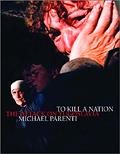 Michael Parenti’s To Kill A Nation: The Attack on Yugoslavia analyzes Yugoslavia’s violent dissolution from the beginning. Though its economic preconceptions may be disputable, Parenti’s incisive work contributes a great deal to understanding the clear pattern of dismemberment that emerges from consecutive Imperial interventions. (see review)
Michael Parenti’s To Kill A Nation: The Attack on Yugoslavia analyzes Yugoslavia’s violent dissolution from the beginning. Though its economic preconceptions may be disputable, Parenti’s incisive work contributes a great deal to understanding the clear pattern of dismemberment that emerges from consecutive Imperial interventions. (see review)
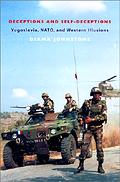 In the same league is Diana Johnstone’s Fools’ Crusade: Yugoslavia, NATO and Western Delusions (see reviews here, here and here). Johnstone not only analyzes the Imperial interventions, she also addresses the leftist warmongers who spearheaded them, a frequently ignored subject. Read intro here.
In the same league is Diana Johnstone’s Fools’ Crusade: Yugoslavia, NATO and Western Delusions (see reviews here, here and here). Johnstone not only analyzes the Imperial interventions, she also addresses the leftist warmongers who spearheaded them, a frequently ignored subject. Read intro here.
Honorable Mentions
Scott Taylor’s Inat: Images of Serbia and the Kosovo Conflict and Diary of an Uncivil War (read excerpt) are a refreshing break from the mainstream-peddled nonsense about the wars in Kosovo and Macedonia is, though some people might be put off by the magazine-style prose. Taylor has long followed the Canadian military, and seems to have a keen sense for recognizing baloney when he hears it.
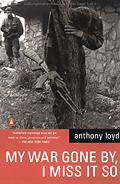 Anthony Lloyd’s My War Gone By, I Miss It So may not seem like worthy reading at first. A confessed English drug-user with family issues, Lloyd sought out danger in Bosnia and Chechnya, posing as a journalist but really just spending time with the locals. His picture of war is gritty and realistic. His experiences with Muslims and Croats – he hated Serbs – offer invaluable glimpses into the collective hysteria that was Bosnia at war. Not for the queasy, but definitely worth reading.
Anthony Lloyd’s My War Gone By, I Miss It So may not seem like worthy reading at first. A confessed English drug-user with family issues, Lloyd sought out danger in Bosnia and Chechnya, posing as a journalist but really just spending time with the locals. His picture of war is gritty and realistic. His experiences with Muslims and Croats – he hated Serbs – offer invaluable glimpses into the collective hysteria that was Bosnia at war. Not for the queasy, but definitely worth reading.
Coda
This list is by no means definitive, or final. New works are becoming available every day, and some of them may not be rubbish. Suggestions for book reviews are very much welcome, of course. Perhaps some day, the quality of reason will manage to overwhelm the quantity of lies peddled in its stead. Here’s to hope that it does.


